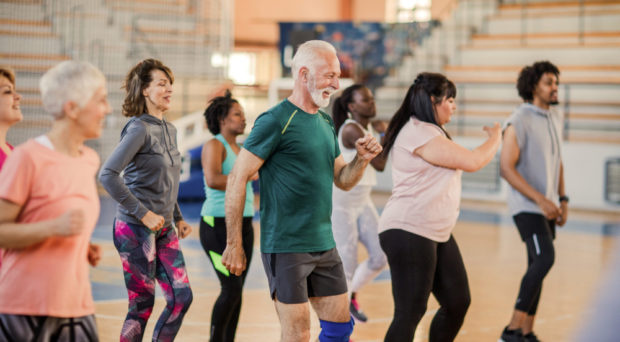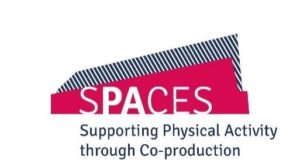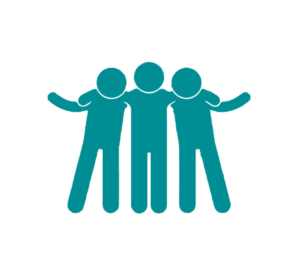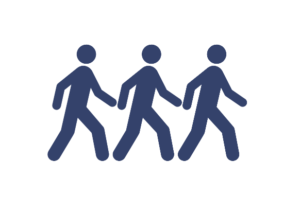
 People with severe mental ill health (SMI) die on average 15-20 years prematurely, with over 70% of deaths attributed to preventable physical health conditions. Being physically active can reduce the risk of cardiovascular disease, diabetes and metabolic syndrome and improve mental wellbeing.
People with severe mental ill health (SMI) die on average 15-20 years prematurely, with over 70% of deaths attributed to preventable physical health conditions. Being physically active can reduce the risk of cardiovascular disease, diabetes and metabolic syndrome and improve mental wellbeing.
People with SMI report engaging in lower levels of physical activity and higher levels of sedentary behaviour than the general population and experience several unique barriers to engaging in physical activity. These barriers include cost, availability, lack of social support and low motivation among several others.
The SPACES research project – Supporting Physical Activity through Co-production in people with Severe Mental Illness – aims to address this issue by developing and evaluating an intervention to increase physical activity among people with SMI.
SPACES is an ongoing 6-year multi-site programme of research funded by the NIHR with co-production at its core. People with SMI have collaborated with the research team at all stages, from developing the research question all the way through to steering the design of the SPACES intervention.
 Over the last 12 months, the research team have gathered information from focus groups, survey responses and a systematic review of the literature to a) identify the barriers and facilitators to physical activity and b) establish the effective components of existing interventions for people with SMI. The findings were presented to our Consensus Group made up of people with SMI, carers and health professionals who support people with SMI.
Over the last 12 months, the research team have gathered information from focus groups, survey responses and a systematic review of the literature to a) identify the barriers and facilitators to physical activity and b) establish the effective components of existing interventions for people with SMI. The findings were presented to our Consensus Group made up of people with SMI, carers and health professionals who support people with SMI.
Using the evidence collected as well as their own experiences, the Consensus Group have been able to input into the production of the SPACES intervention in collaboration with the research team.
The SPACES intervention is an 18-week physical activity programme that features:
- Weekly group sessions, led by two trained Physical Activity Coordinators (PACs), with up to 60 minutes of physical activity, 30 minutes for a themed discussion on topics surrounding physical activity, and 30 minutes for socialising and addressing any queries.
- 1-to-1 support between PAC and participant at regular intervals throughout the intervention, including long-form consultations (45 to 60 minutes) and brief check-ins (15 to 30 minutes).
- Weekly session attendance prompts.
- Peer support from those taking part in the intervention (e.g. participants may choose to create a WhatsApp group to keep in touch outside of weekly sessions).
- Additional resources such as a participant handbook and a wearable activity monitor.

The intervention is underpinned by behavioural science and includes a number of behaviour change techniques throughout such as goal setting, problem-solving, and self-monitoring.
The feasibility study
The SPACES research project now aims to evaluate the acceptability of the SPACES intervention and the feasibility of running a full-scale randomised controlled trial. To do so, approximately seven NHS trust sites will take part in a feasibility randomised controlled trial, which has been registered with the ISRCTN registry.
Within these sites, researchers will recruit patients with SMI who are interested in increasing their levels of physical activity. Researchers will also recruit staff from these sites with experience of working with people with SMI and/or providing physical activity support to perform the role of PACs.
At each site, participants will be randomised to either take part in the SPACES intervention or to continue treatment as usual. Participants from the intervention group and PACs will be asked to provide feedback on their experience of taking part in the trial in order to evaluate acceptability and feasibility. In addition, physical activity measures (i.e., an ‘ActiGraph’ accelerometer) and questionnaire data collected at baseline, 3- and 6-month post randomisation will explore participant activity levels, physical and mental health, quality of life and use of health care resources.
Results from this feasibility trial will inform progression to a larger scale randomised controlled trial exploring the effectiveness and cost-effectiveness of the SPACES intervention.
Recruitment for the feasibility trial will begin in September 2022. Updates on the progress of this project can be viewed via the Closing the Gap Network Twitter page: @CTGNetworkUK.
Comments